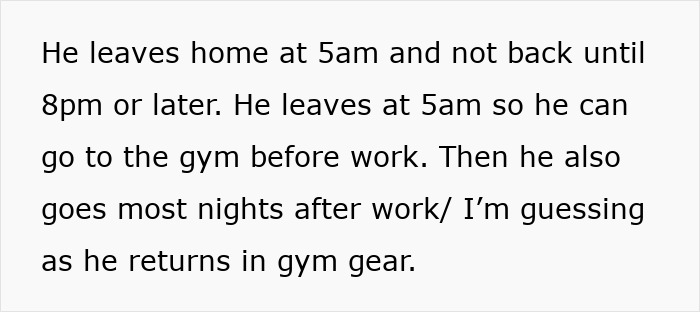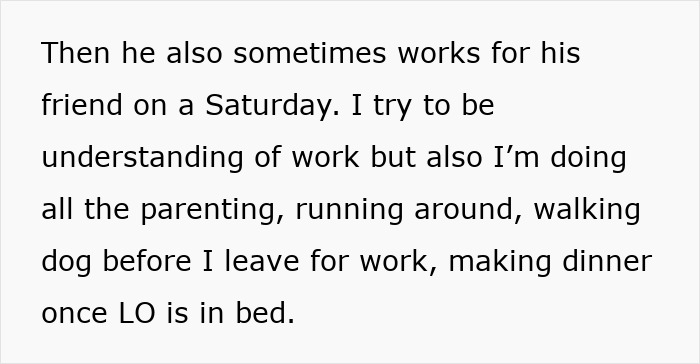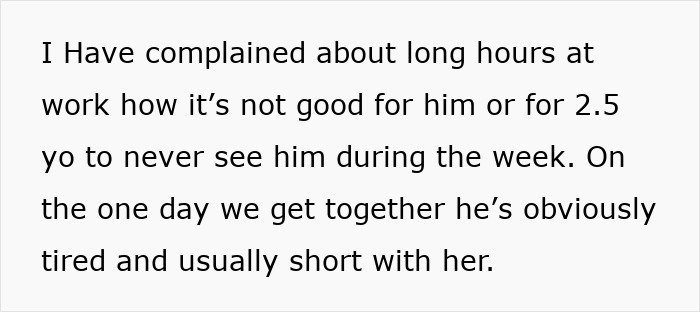Life can feel overwhelming when one partner shoulders the majority of parenting and household responsibilities, especially during pregnancy and with a young child at home. Balancing work, childcare, and household tasks is challenging enough, and it becomes even more difficult when your partner’s schedule and choices leave little room for shared support.
In this story, today’s Original Poster (OP) was pregnant and managing the house while her husband worked long hours and often engaged in habits that left her deeply upset, and netizens are insisting there’s no redemption for him.
More info: Mumsnet
Having an unsupportive partner during pregnancy isn’t just inconvenient; it can take a serious emotional and physical toll

Image credits: Getty Images / Unsplash (not the actual photo)
The author juggled a toddler, household chores, a large dog, and work, while her husband worked long hours and spent extra time at the gym, pub, and side jobs






Image credits: YourOliveZebra

Image credits: syda_productions / Freepik (not the actual photo)
His inconsistent presence, swearing in front of their child, and new habits like smoking made her even more frustrated





Image credits: YourOliveZebra

Image credits: hryshchyshen / Freepik (not the actual photo)
Whenever she brought up her concerns to her husband, there would be short-term changes that quickly reverted to old patterns





Image credits: YourOliveZebra
When she decided she had had enough, she brought up her concerns again and her husband accused her of “always complaining” and “never being happy”
The OP noted that her husband often left the house at 5 a.m., squeezing in gym time before work, and then sometimes hitting the gym again after returning. She added that sometimes he might log back in to work until 10 or 11 p.m., and would also work for a friend on Saturdays.
Meanwhile, at 30 weeks pregnant, she handled early morning dog walks, nursery drop-offs for their 2.5-year-old, dinner, bedtime, cleaning, and house management. Occasionally, her husband might do the ironing, dishwashing, or weekend cooking.
She stated that she repeatedly raised concerns about his long hours, lack of presence, impatience with their toddler, swearing, and hidden smoking habit, and while he would try to improve for a week or so, his old habits would return. He would also go to the pub and take their child along to the point that all their daughter wanted to do was go to the pub.
Whenever the OP would bring up his habits, he would tell her to leave if she was not happy and claim she was “always complaining” and “never happy,” even after providing a bigger house and earning more. Naturally, this has left her feeling unheard and exhausted.
To better understand the impact of inconsistent parenting on families and the problem the OP is facing, Bored Panda spoke with licensed marriage and family therapist Christine Lawler, who explained that cycles of short-term “good behavior” followed by a return to old habits can feel like emotional whiplash for everyone involved.
“Partners get hopeful, only to be disappointed again, which strains trust and makes communication tense. Some toddlers and young children are even sensitive to these shifts, often feeling insecure or confused about what’s normal,” she said. Over time, she noted, families may adapt to unpredictability rather than stability, unintentionally reinforcing the cycle.

Image credits: nagaets / Freepik (not the actual photo)
We asked whether financial contribution can ever make up for a lack of presence or participation in daily parenting, like in the case of the OP, and Lawler was clear. “Money can ease stress at home, but it can’t replace actual parenting. Partners and kids need love, attention, emotional connection, and shared experiences, things no paycheck can buy.”
She added that when one parent contributes primarily financially, children may feel distant, while the other partner can feel unsupported or resentful. “Healthy family life requires both. Resources to meet practical needs and hands-on involvement to nurture emotional well-being.”
Finally, we asked how couples can prepare for a second child when the first child and household responsibilities already create an imbalance. “Couples should first take stock of current responsibilities and pinpoint where tensions arise,” Lawler explained.
“Clear discussions about who will handle new tasks from nighttime care to household chores are crucial, rather than assuming things will naturally balance out,” she stated before suggesting building support systems, like extended family, friends, or childcare, and practicing small, consistent shifts in daily routines.
Netizens questioned the husband’s fidelity and criticized his lack of parenting involvement and his seeming inability to understand what it means to be a father or husband. Others focused on the incompatibility between the OP and her husband, suggesting that her concerns are unlikely to be resolved.
What do you think about this situation? Do you think OP’s husband is really checked out, or could there be another perspective? We would love to know your thoughts!
He also added that he was done with her, and netizens expressed their disgust and insisted the author was better off without him anyway




 Follow Us
Follow Us





